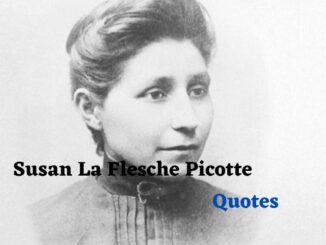Susan La Flesche Picotte Accomplishments
Born in 1865 on the 17th of June, in the Omaha reservation in north-eastern Nebraska, Susan La Flesche Picotte is the first Native American to receive a medical degree. As an 8-year-old girl, Susan sat next to an old woman in Omaha while she waited for the doctor to arrive. But the doctor never came and the old lady died in pain.
Later on, Susan La Flesche Picotte, went on to credit that moment as the motivation that drew her to pursue her barrier-breaking career in public health, medicine, and advocacy for indigenous rights. So here are some of Susan’s accomplishments that she achieved throughout her career that are remembered to this day.
1. She was the first Native American to earn a degree
Susan La Flesche Picotte was the first Native American to receive a medical degree. This achievement was quite impressive at the time especially since women were subjected to domestic duties.
2. She was a doctor and an advocate for the rights of her people
After earning her medical degree Susan went on to become the sole doctor on the Omaha reservation in the middle of many epidemics. She also started to advocate for the rights of her people. This was a very brave accomplishment as during that time Native Americans were not considered citizens of the country.
3. She learned to speak multiple languages
Susan’s father believed that if their people were to persist, they had to educate themselves on the ways of the white Americans as well as their own culture. As a result of this Susan spoke not only Otoe and Omaha, but also spoke English and French.
4. She graduated as a top student
With her additional qualifications especially in languages, she joined the Women’s Medical College of Pennsylvania. In 1889 she graduated at the top of her class.
5. She fought for her right to become a government doctor in the Omaha region
After earning her medical degree, Susan petitioned the Commissioner of Indian affairs. After much effort in 1889, she received a position as a government doctor on the Omaha reservation.
6. She treated hundreds of people through various epidemics
Even though Susan’s role was described as an example of white medical practices substituting indigenous practices, she continued to nurse hundreds of people that were affected during various epidemics such as cholera, tuberculosis, and the flu. Due to this, she became an integral part of the community.
7. She became an advisor for health and Law
Every single day, Susan traveled the 1350 square mile reservation to make house calls starting from 8 am to 10 pm. She also used her home as an office which became a community hub where she advised on everything from health to Law.
8. She became an advocate for hygiene
After Susan lost her husband due to tuberculosis she started to understand that medical care alone was not enough. As a result, she decided to become an advocate for public hygiene measures such as abandoning shared drinking cups, screens for windows and doors, fly traps, etc.
9. She made efforts to ban liquor sales on the reservation
Susan wrote letters to the commissioner of Indian Affairs in the form of impassioned pleas to ban liquor sales on the reservation. Despite the fact that activism started to take a toll on her own health, she continued to fight for what is right.
10. She fundraised to help improve medical care on the reservation
Even during her last days, Susan continued to make efforts to improve the economic and health conditions of Omaha. In 1913, she managed to start a fundraiser that helped to build the county’s first modern hospital, and the first hospital to be privately funded on a reservation.
Overall, Susan La Flesche Picotte is a well-known individual who always made efforts for the betterment of her people and society. However, the issues that Susan fought for such as land rights, public health, and tribal sovereignty are areas where indigenous people are still facing inequity to this day in America. Despite this, Susan’s work is still being continued by present-day activists, and she has managed to inspire generations of women as well as indigenous physicians.
You May Also Like:
